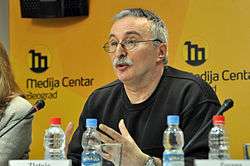Zlatoje Martinov
| Zlatoje Martinov | |
|---|---|
 | |
| Born |
16 December 1953 Pančevo, SR Serbia, SFR Yugoslavia |
| Nationality | Serbian |
Zlatoje Martinov (Serbian-Cyrillic: Златоје Мартинов; born 16 December 1953, Pančevo) is a Serbian publicist and writer.
Biography
Martinov studied economics (BS) at the University of Belgrade. He is director of the cooperative Res Publica, was assistant of Nebojša Popov for several years and last editor-in-chief of the magazine Republika. His reports, reviews and essays are regularly also published in magazines such as Sveske (Serbian: Notebooks), Krovovi (Serbian: Roofs), Fenster (German: Windows) and some others. His critical articles reflect social, political, cultural and historical themes of Serbian society.
Martinov was the director of the Documentation Center of Germans of Vojvodina (Centar za dokumentaciju o vojvođanskim Nemcima) from 1994 to 2002, and during this time he promoted cultural dialogue between Serbian majority and German minority. He is interested in Esperanto culture since several decades, member of the Esperanto PEN center in La Chaux-de-Fonds and editor-in-chief of the Esperanto magazine Literatura Foiro. The writer lives in Belgrade.[1][2][3][4][5][6][7][8]
Bibliography (selection)
Prose
- Osmeh Emi Majer (The Smile of Emi Majer; short stories), Banatski Forum, Pančevo 2002, ISBN 86-902963-1-X.[9]
- Preljubnička biblija: priče (Adulterous Bible: short stories), Mali Nemo, Pančevo 2004, ISBN 86-83453-40-5.
Poetry
- Svetu na dar: antologija srpske poezije za decu (A Gift to the World: Anthology of Serbian Poems for Children), in Serbian and Esperanto, Strategia, Belgrade 1996.
Essays
- Ideja, egzistencija i savremeni problemi međunarodnog jezika (Idea, Existence and Problems of Modern International Language), Društvo prijatelja međunarodnog jezika esperanto, Pančevo 1980.
- Esperanto: jezik i pokret (Esperanto: Language and Movement), Međunarodni centar zu usluge u kulturi, Zagreb 1985.
- U podnožju demokratskih propileja: izbori u Srbiji 1990–2000 (On the Base of Democratic Propylaea: Elections in Serbia 1990 − 2000), Res Publica, Belgrade 2000.
- Nemački uticaj na ishranu Srba u Banatu (The German Influence on Nutrition of Serbs in Banat), Mali Nemo, Pančevo 1997 and 2004, ISBN 86-83453-47-2.
- Hermeneutika književne estetike (Hermeneutics of Literary Aesthetics; collected reviews), Mali Nemo, Pančevo 2006, ISBN 86-83453-84-7.
- Sloboda kao ponornica: Republika 1907–2013 (Undercurrents of Freedom), Res Publica, Belgrade 2013, ISBN 978-86-86487-07-0.[10]
- Gavrilo Princip – heroj ili terorista? (Gavrilo Princip – Hero or Terrorist?), Rosa Luxemburg Foundation Southeast Europe, Belgrade 2014.[11]
Articles
- Zašto Kosovo nije "srce Srbije"? (Why Kosovo Is Not the "Heart of Serbia"?), Republika No. 426-427, Belgrade 2008.[12]
- Začarani krug (Vicious Circle), newsletter of Medija Centar Beograd (Медија Центар Београд), Belgrade 2011.[13]
- Međunarodni jezik esperanto – jezik budućnosti (International Language Esperanto − a Language of the Future), Kulturni heroj, Novi Sad 2016.[14]
Drama
References
- ↑ Republika, Archive 1996–2015, Retrieved on 2017-05-16.
- ↑ Biography (p. 6) in Zlatoje Martinov, Gavrilo Princip – Held oder Terrorist? (PDF; German), Rosa Luxemburg Foundation, Retrieved on 2017-01-24.
- ↑ Official Website by Res Publica, Retrieved on 2017-05-13.
- ↑ Sveske, by Mali Nemo, Retrieved on 2017-01-24.
- ↑ Krovovi on Kubon&Sagner Media, Retrieved on 2017-05-16.
- ↑ Esperanta PEN on the Website by Esperanta Civito, Retrieved on 2017-05-14.
- ↑ Literatura Foiro on the Website by Esperanta Civito, Retrieved on 2017-05-13.
- ↑ Zlatoje Martinov on LinkedIn
- ↑ Das Lächeln der Emi Meier (German), Fenster No. 06/2006 (PDF), p. 22-24, Retrieved on 2017-05-14.
- ↑ Zlatoje Martinov in Catalogue of National Library of Serbia, Retrieved on 2017-01-25.
- ↑ Gavrilo Princip – heroj ili terorista? (PDF), Retrieved on 2017-05-13.
- ↑ Serbian (Republika Archive) English (Bosnian Institute), Retrieved on 2017-05-17.
- ↑ Serbian and English, Retrieved on 2017-05-18.
- ↑ Međunarodni jezik esperanto – jezik budućnosti, Kulturni Heroj (online magazine), Retrieved on 2017-05-17.
- ↑ Kobno pismo, Review by Dimitrije Janičić, Retrieved on 2017-01-25